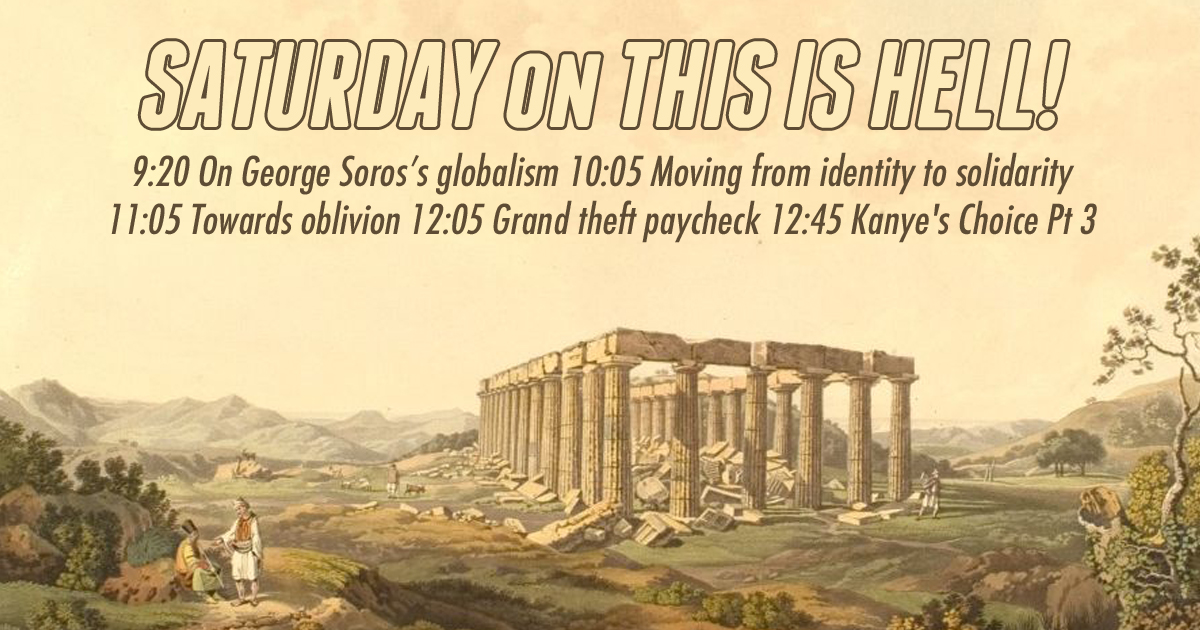
John Washington joins us to discuss his recent piece in the New York Review of Books, "The Roots of Bukele’s Gulag." An all new "Rotten History" and "The Moment of Truth" segments follow the interview.
Help keep This Is Hell! completely listener supported and access bonus episodes by subscribing to our Patreon.
2020 Flashback: Generalized Precarity and Subversive Pragmatism / Albena Azmanova
Resisting "Cop City" in America's Most Surveilled, Unequal City / Micah Herskind
Welcome to the Moment of Truth: the thirst that is the drink.
The Jews, my people. Such a stiff-necked people. You want to own the Holocaust, I get it. You don't want to share the word "concentration camp." Yeah, that makes sense. Those little children at the southern border aren't being forced to do labor, so we can't call them labor camps. They're not being exterminated or worked to death, so we can't call them extermination camps or death camps. We can call them "internment camps," because it's like they're in prison. But not concentration camps? Because that's our word? Even though they're being concentrated into a camp? That's not enough for you? You think they invented the concentration camp just for Jews in Europe in the 30s and 40s? I won't go into the historical error you're making, there's a Slate article for that.
What I'm going to beat you up about is, just don't be so morally superior. Don't hold your suffering over others. We're on the verge of losing the special victim status associated with the Shoah, and holding onto "concentration camp" doesn't really help. All over Europe and here in the US, new rightwing nationalist groups are firmly establishing themselves. It's not just anti-Semitism they're peddling, either, it's anti-foreigner, whatever they decide a foreigner is. And I want them to know that, if they're concentrating people in camps, or if they're beating people up, or making anti-foreigner laws aimed at "strengthening the borders," whatever they want to call it, it does resemble the rise of fascism in Europe in the 20s and 30s of last century. This is what it looked like.
They want to say, "Look, this is a special problem, these Latins or Muslims, or whatever, so a little nativist suspicion and anti-immigrant rhetoric here or there is okay, it's not a sign we're on the slippery slope toward Hitler, Franco, Vichy or Mussolini. Let's at least rehabilitate love of country! Our country for us! America first. Is that so bad? At least we're not keeping people in concentration camps." Bee ess. It's the same old fascism they're constructing, and if you aren't behind calling them out for their attempts to put a white Christian dictatorship in place of our nominal democracy, take your silly asses home. Don't worry, they'll come for you later. Want to wait till you're packed into a cattle car to Wyoming to call them what they are? More fool you.
And my black friends, is it really so important, as... read more

Listen live from 9AM - 1:00PM Central on WNUR 89.3FM / stream at www.thisishell.com / subscribe to the podcast
9:20 - Historian Daniel Bessner explores the blindspots in George Soros's worldview.
Daniel wrote the article The Globalist: George Soros after the open society for N+1.
10:05 - Writer Asad Haider explains how a new politics of race and class can power collective action.
Asad is author of Mistaken Identity: Race and Class in the Age of Trump from Verso.
11:05 - Writer Thomas Frank tours the collapsing landscape of late-stage America.
Tom is author of Rendezvous with Oblivion: Reports from a Sinking Society from Metropolitan Books.
12:05 - Policy researcher Philip Mattera investigates the booming business of corporate wage theft.
Philip is author of the report Grand Theft Paycheck: The Large Corporations Shortchanging Their Workers' Wages from Good Jobs First.
12:45 - In a Moment of Truth, Jeff Dorchen Presents Kanye's Choice Part 3: The Dumbening and the Smarting
Listen to Parts One and Two if you need to catch up.
Welcome to the Moment of Truth: the thirst that is the drink.
Last week I talked about the artifacts by which we remember both the Shoah and the Captivity of black people in the west. This week I'm going to talk about their comparative aesthetics. The Shoah is mainly urban, industrial, scientific, Norse, Protestant, art deco, sado-masochistic/black leather, red, black and white. The slavery chapter of the Captivity is mainly represented in earth-tones, with hints of blue, and the dripping green of kudzu, rural, agrarian, folk, Southern Baptist, sun- dappled, outsider and itinerant artsy, colonial, linen, and bondage sadist.
The biblical character Moses figures in the liberation theology of both, though ironically more so in the Captivity than in the Shoah. The Shoah's iconography of liberation tends more toward the Maccabean than the Mosaic. Although there are both armies and solitary figures of liberation associated with both mass atrocities, in the Shoah the main figures of resistance, the partisans and the Allies, are armies, akin to the Maccabees if anything biblical, and the downfall of the bureaucratic/industrial enemy is a military one; while Harriet Tubman, guiding her people to freedom through the Underground Railroad as the Moses figure of the Captivity, looms large; liberation depends on the courage and perseverance of individual heroes in the face of interpersonal if pandemic human hatred, hatred that was enacted anew every time an individual crime against dark-skinned humans was committed.
While the portrait of Nazism is painted against a background of policies and laws under which a dormant, innate anti-Semitism was enabled to emerge, giving a great multitude of Europeans permission to commit the crimes they'd always wanted to commit, the institution of slavery was considered the economic end, the means to which was the manipulation of hatred that turned people against their better natures, although this diagram of hatred has since transformed to one more closely resembling the Nazi license model as the Captivity has moved from its slavery phase into its Black Codes, Jim Crow and current carceral/more obviously genocidal phases. Does society make us racists? Or does it merely allow us to act out our inborn hatred of the Other? The answer isn't limited to those choices, especially now that we no longer diagram human nature as reducible to a solid or binary thing but as a spectrum, and a fluid one... read more

Listen live from 9AM - 1:00PM Central on WNUR 89.3FM / stream at www.thisishell.com / subscribe to the podcast
9:20 - Neuroscientist Sarah-Jayne Blakemore explores the new science of the teenage brain.
Sarah-Jayne is author of Inventing Ourselves: The Secret Life of the Teenage Brain from PublicAffairs.
10:00 - Historian Sean Guillory examines the bleak present (and future) of the Russian left.
Sean wrote the article Left in a Corner for Jacobin and makes the very recommended Sean's Russia Blog Podcast.
11:05 - Writer Mark Kurlansky traces the long, complicated, economic and social history of milk.
Mark is author of Milk! A 10,000-Year Food Fracas from Bloomsbury.
12:00 - Environmentalist Helena Norberg-Hodge calls for a movement towards economic localization.
Helena wrote the essay Localisation: A strategic solution to globalised authoritarianism for the Transnational Institute.
12:45 - In a Moment of Truth, Jeff Dorchen shines up some atrocities to see his reflection.
Welcome to the Moment of Truth: the thirst that is the drink.
Several times I've heard and read complaints that the Jewish Holocaust is treated with more sanctity and inviolability in the media than slavery, by which I and apparently everyone else mean the capture, captivity and transport of black Africans from the African continent to the Americas, especially the United States, and their forced labor and unconscionable persecution here. Recently a friend of mine posted bitterly on the ol' FB about Kanye's record being the hottest one in the country right now despite his airing of the moronic and offensive opinion that slavery was the choice of the enslaved. This friend opined that, had Yeezy said the Holocaust was a choice, there would've been hell to pay. And he's probably correct. I say probably because it's a hypothetical situation, not because there's much doubt in my mind.
I won't go into the very valid reasons he came up with for this disparity. I'm more interested in how the Holocaust is perceived in the cultural imagination compared to perceptions of the Captivity, which is how I will refer to slavery per se, but also the repercussive subsequent persecution of black people in the USA. Though distinct historically, I think the various stages of the persecution deserve to be linked, and I think so because of things I've read and heard from black intellectuals and personalities and persons I respect, and because of evidence supplied by the behavior of white people around me, which seems to be worsening thanks to behavior and rhetoric of the current inhabitant of the White House.
I can already tell this will be at least a two-part discussion, so I'll confine this week's part of it to examining the amount and type of documentation of the Holocaust, or Shoah, and that of the Captivity.
From its first discovery by Allied soldiers at the end of WWII, the horror of the extermination of Jews and peoples of other qualities unacceptable to the Nazi culture revealed itself like a hidden shame. The Nazis did their best to keep their industrial mass murders a secret, fearing that even their own people, trained though they were to hate deviance from Aryan perfection, would balk at such massive horror.
And yet, being a supremely self-admiring bureaucracy, it was nevertheless considered essential to document the progress of the cleansing of the Reich. The Nazis destroyed all the evidence they could as the Allied... read more

Listen live from 9AM - 1:00PM Central on WNUR 89.3FM / stream at www.thisishell.com / subscribe to the podcast
9:20 - Cultural critic Henry Giroux explores the rise of fascism and the construction of political dystopia.
Henry is author of American Nightmare: Facing the Challenge of Fascism from City Lights.
10:00 - Our Man in San Juan, Dave Buchen reports on the invisible anxiety of life in the colonies.
Dave will also be talking about the return of Hurricane season in Puerto Rico, on the more visible end of the anxiety spectrum.
10:35 - Historian David Broder explains how Italy's hard right emerged from the left's collapse.
David wrote the articles Salvini’s Triumph and Notes on Italy's Election for Jacobin.
11:05 - Writer Elizabeth Rush watches climate change roll across America's new shoreline.
Elizabeth is the author of Rising: Dispatches from the New American Shore from Milkweed Editions.
12:05 - Steven Miller and Nicholas Davis examine the link between White intolerance and anti-democratic values.
Steven and Nicholas are authors of the paper White Outgroup Intolerance and Declining Support for American Democracy.
12:45 - In a Moment of Truth, Jeff Dorchen goes shopping for Holocausts.



